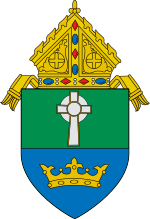Michael Joseph Begley
Michael Joseph Begley (March 12, 1909 – February 9, 2002) was an American clergyman of the Roman Catholic Church. He was the first Bishop of Charlotte, North Carolina from 1972 until 1984.
Biography
Begley was born in West Springfield, Massachusetts, to Dennis and Anna (née Moynahan) Begley.[1][2] His father came to the United States from County Kerry in Ireland.[2] He received his early education at West Springfield public schools and at Cathedral High School.[2] He studied at Mount St. Mary's College in Emmitsburg, Maryland, from where he obtained a Bachelor of Arts degree in 1930.[1] He was ordained to the priesthood by Bishop Thomas Michael O'Leary on May 26, 1934, for the Diocese of Raleigh, North Carolina.[3] His first assignments were at Basilica Shrine of St. Mary in Wilmington and at St. Edward Church in High Point.[4]
He then served as pastor of St. Therese Church in Wrightsville Beach, Immaculate Conception Church in Wilmington (1938–1942), and at St. Leo the Great Church in Winston-Salem (1942–1955).[4] He earned a Master of Social Work degree from the University of North Carolina in 1949, and was named a Domestic Prelate in 1954.[1] In 1955, he became the first pastor of St. Ann Church in Charlotte.[4] He was later made superintendent of Raleigh's Catholic orphanage and pastor of Our Lady of Grace Church in Greensboro.[4]
On November 30, 1971, Begley was appointed the first Bishop of the newly erected Diocese of Charlotte by Pope Paul VI.[3] He received his episcopal consecration on January 12, 1972 from Archbishop Luigi Raimondi, with Bishops Vincent Stanislaus Waters and George Edward Lynch serving as co-consecrators.[3] He selected as his motto: "Diligimus Fratres" ("We Have Loved the Brethren").[2] In addition to his duties as a diocesan bishop, he also served as chairman of the Catholic Committee on Appalachia.[4] In this capacity, he led 26 other bishops from 13 states in issuing a joint pastoral letter "This Land is Home to Me" on the state of the powerless in the region.[2] A supporter of capital punishment, Begley endorsed the 1984 execution of Velma Barfield, noting, "The state has a right to decide on the death penalty and this is one instance when they chose that right."[5] Upon reaching the mandatory retirement age of 75, Begley submitted his letter of resignation to Pope John Paul II in March 1984. His resignation was accepted on May 29, 1984, and was succeeded by John Francis Donoghue.[3]
Begley died at Maryfield Nursing Home in High Point, aged 92.[2] He was a cousin of Bishop William Joseph Hafey, and baptized Bishop Peter Joseph Jugis as a child.[4]
See also
- Catholic Church hierarchy
- Catholic Church in the United States
- Historical list of the Catholic bishops of the United States
- List of Catholic bishops of the United States
- Lists of patriarchs, archbishops, and bishops
References
- Curtis, Georgina Pell (1977). The American Catholic Who's Who. XXI. Grosse Pointe, Michigan: Walter Romig.
- "Death Notice". The Charlotte Observer. 2002-02-11.
- "Bishop Michael Joseph Begley". Catholic-Hierarchy.org.
- Murray, Kevin E (2009-03-13). "Celebrating the diocese's first shepherd" (PDF). The Catholic News & Herald.
- Megivern, James J (1997). The Death Penalty: An Historical and Theological Survey. Mahwah: Paulist Press.
External links
Episcopal succession
| Catholic Church titles | ||
|---|---|---|
| Preceded by none |
Bishop of Charlotte 1971–1984 |
Succeeded by John Francis Donoghue |
